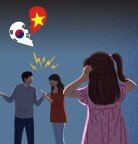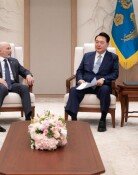A doctor who sacrificed himself to save others
A doctor who sacrificed himself to save others
Posted February. 08, 2019 07:24,
Updated February. 08, 2019 07:24
Dr. Yoon Han-deok, the chief of the National Emergency Medical Center, was found dead with sudden cardiac arrest at his office on Monday, one day before the lunar new year. He was found sitting in front of his desk. The cause of his death is assumed to be overwork as he worked and stayed at the hospital to prevent "medical vacuum" during the Lunar New Year holidays. Being aware of his overwork, his family thought it must have been a usual situation even though Dr. Yoon was not reachable during the past weekend.
National holidays are the busiest time for the Disaster & Emergency Medical Operation Center of the National Emergency Medical Center, which is in charge of emergency medical centers and institutions as well as regional injury centers nationwide. Back in the Korean thanksgiving holidays in October 2017, Dr. Yoon wrote “Ten days of holidays! This itself is a disaster for emergency care units!” on his Facebook page. Despite the continuous occurrence of emergency patients nationwide during national holidays, emergency units are saturated as hospitals and medical centers are closed. He did not leave work and was alone when his life came to an end. The sacrifice of Dr. Yoon, who could not take care of his own health while working day and night trying to save someone else’s life, makes us lower our heads.
Dr. Yoon used to say that a nation must provide citizens the right to lose consciousness without any concern. He was the first medical resident at the department of emergency medicine at Chonnam National University, participated in the opening of the National Emergency Medical Center in 2002 and became the head of the center in 2012. Up until now, he led the adoption of regional injury centers and doctor helicopters as well as the creation of the National Emergency Diagnosis Information System. Indeed, he was known as the living witness of the emergency medical system of Korea. He passed away at the scene of emergency medical care unit, a place which he called "hell" due to poor working conditions where tensions cannot be lost for 24 hours. Giving his tribute, President Moon Jae-in said, “I am sorry but also thankful for Dr. Yoon. During the holidays, he prioritized the lives and safety of the citizens more than himself and his family.”
Investments in human resources and facilities are not made in emergency and intensive care units because they does not make much money. Medical staffs also avoid such units due to strenuous work not to mention overnight duties. As Dr. Yoon showed us, we are protected by the sacrifice of others who do not mind such hard work. We ought to be thankful for their sacrifices but we cannot just rely on a few heroes’ sense of mission. The ratio of patients among the number of deaths from injuries who could have been saved if they were able to receive treatment at the right time reaches up to 30.5 percent. In other words, one out of every three patients is saved once they are transferred to the hospital and received appropriate treatment within the golden time. The government can pay a tribute to Dr. Yoon’s precious life by making efforts in building a structural system by setting a reasonable price system for emergency medical treatment and fostering human resources.







